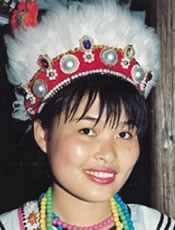Paiwanese, Tamari in Taiwan

Photo Source:
Copyrighted © 2026
Operation China, Asia Harvest All rights reserved. Used with permission |
Send Joshua Project a map of this people group.
|
| People Name: | Paiwanese, Tamari |
| Country: | Taiwan |
| 10/40 Window: | Yes |
| Population: | 95,000 |
| World Population: | 95,700 |
| Primary Language: | Paiwan |
| Primary Religion: | Christianity |
| Christian Adherents: | 70.00 % |
| Evangelicals: | 30.00 % |
| Scripture: | Complete Bible |
| Ministry Resources: | No |
| Jesus Film: | No |
| Audio Recordings: | Yes |
| People Cluster: | Taiwan Indigenous |
| Affinity Bloc: | East Asian Peoples |
| Progress Level: |
|
Introduction / History
The Paiwan are one of three tribes, along with the Ami and Bunun, who were combined to form the official Gaoshan nationality in China. The name Gaoshan means "high mountain" in Chinese and is not the name of a specific ethnic group or language. The Paiwan believe they originated from an egg. Their legends say the sun laid two eggs that were hatched by a green snake.
In the past the Paiwan had a fearsome reputation as head-hunters. When Paiwan warriors returned home from a headhunting foray, "the women would gather together in front of the courtyard to welcome their heroes and would sing songs of triumph. The heads of their enemies were then hung on stone pillars in front of which were displayed wine and offerings. The sacrificial rite started, and the soul of the dead was duly consoled by the sorcerer. A tuft of hair was removed from the skull and solemnly put in a basket which was used for divination." During the civil war, between 1946 and 1949, many Paiwan men were forcibly enlisted in the Kuomintang forces. When the war ended, some of the Paiwan remained behind in China and formed their own communities.
What Are Their Lives Like?
Unlike other tribes in Taiwan, Paiwan society is divided into classes with a hereditary aristocracy. The Paiwan are not allowed to marry outside their tribe. On the day of their "five-yearly rite," "all marriage-seeking Paiwan men try to cut down as many trees as possible and offer the firewood thus procured to the family of the girl they want to woo."
What Are Their Beliefs?
Traditionally the Paiwan have been polytheists. Their wooden carvings included images of human heads, snakes, deer, and geometric designs. In Taiwan, the Bataul branch of the Paiwan tribe holds a major sacrifice - called maleveq - every five years to invite the spirits of their ancestors to come and bless them.
Christianity first came to the Paiwan people in the seventeenth century, when Taiwan was occupied by the Dutch. More than 5,000 tribesmen became Christians after only ten years, but all of them were massacred in 1661 when Cheng Gong Zheng liberated Taiwan. The missionaries were either killed or driven away, and the churches were destroyed. Thousands of Paiwan people in Taiwan came to Christ in the late 1940s and 1950s. Whole villages embraced the good news and appropriated Christ's pardon and offer of salvation. Today the Presbyterian church in Taiwan claims 14,900 Paiwan members, meeting in 96 congregations. The New Testament has been translated into Paiwan but is not available in Mainland China.
What Are Their Needs?
The Paiwan people need to be disciples into obedience to Jesus Christ. They need to be trained to make disciples who make more disciples.
Prayer Points
Pray for a Disciple Making Movement to flourish among the Paiwan people.
Pray for the Holy Spirit to move powerfully in their churches.